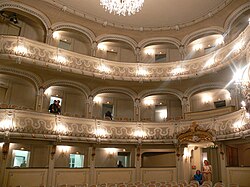|
Schlosstheater Schwetzingen
Schwetzingen Palace and garden Schwetzingen Palace and garden 1 Schwetzingen Palace2 Nördlicher Zirkelsaal (northern circle hall)3 Südlicher Zirkelsaal (southern circle hall)4 Rokokotheater (Rococo theatre)5 Minervatempel (temple)6 Moschee (mosque)7 Merkurtempel (temple)8 Chinesische Brücke (Chinese bridge)9 Apollotempel (temple)10 Badhause (bathhouse)11 Perspektiv (Ende der Welt), illusion12 Orangerie13 Tempel der Botanik (temple of botany)14 Römisches Wasserkastell (Roman water fort)15 Arion-Brunnen (fountain)16 Ehrenhof (courtyard)17 Französischer Garten (French garden)18 Englischer Garten (English garden)Schlosstheater Schwetzingen (Schwetzingen palace theater) is a court theater in Schwetzingen, Baden-Württemberg, Germany. The historic building, opened in 1753, is part of Schloss Schwetzingen and since 1952 the principal venue of the Schwetzingen Festival. It is also called Hoftheater (court theater), Hofoper (court opera), and Comoedienhaus (comedy house). The frequently applied name Rokokotheater (Rococo theater) is misleading, because it shows also neoclassical elements, added in 1762. History Karl Theodor, the Pfalzgraf who resided in Mannheim, had the theater built for his summer residence in Schwetzingen in 1752 to the plans of court architect Nicolas de Pigage.[1] It was opened on 15 June 1753, presenting Ignaz Holzbauer's opera Il figlio delle selve.[2] The theater could then be considered a rococo creation, but was expanded with early neoclassical tendencies. While it first had no boxes, it was enlarged in 1762, creating a "box-like" impression. It is the oldest surviving Rangtheater (theater with boxless tiers) in Europe.[3] The Mozart family visited the theater in 1763 and saw a play.[1][4] When Karl Theodor succeeded Maximilian III Joseph of Bavaria as Elector of Bavaria in 1777, the court had to move to Munich and the theater lost its importance. Its original stage machinery was preserved into the 20th century, but it was replaced by modern facilities in the 1950s and again in the 1970s. As part of the Residenz in the Schwetzingen Castle, it first belonged to the Electors, later to Grand Duchy of Baden, then the state Baden-Württemberg. On 10 November 2022, the Baden-Württemberg state administration of palaces and gardens announced that the theatre would be renamed the "Pigage-Theatre" on 23 August 2023, the three hundredth birthday of the architect Nicolas de Pigage. The justification for this was that the name "Rococo theatre" only came into use in the Nazi period and is misleading because the theatre contains only a few rococo elements and is mainly neoclassical.[5] Andreas Sturm, a CDU member of the Landtag of Baden-Württemberg opposed this renaming publicly, claiming that it destroyed a globally recognised brand. He called the renaming a "secret act without any citizen participation."[6] Sturm found that mentions of the name "Rococo theatre" from the 1920s, showing that the theatre had not received the name in Nazi times. He also submitted a question in the Landtag and organised a petition.[7] On 30 November 2022, the planned renaming was cancelled. PerformancesThe theater is a fitting location for operas and plays from the Baroque and classical period. Voltaire's L'orphelin de la Chine was premiered in 1755, his tragedy Olimpie was premiered in 1762, staged by Cosimo Alessandro Collini (1727–1806).[8][9] Francesca Lebrun, the sister of Franz Danzi, a leading singer of the Mannheim Opera, performed, for example, the part of Parthenia in Anton Schweitzer's Alceste in Schwetzingen in 1775. Schwetzingen FestivalSince 1952 the theater has been the main venue of the Schwetzinger Festspiele (Schwetzingen Festival), which also presents contemporary operas. More than 35 operas have been commissioned and premiered,[10] including works by Hans Werner Henze, Werner Egk, Udo Zimmermann, Aribert Reimann, Salvatore Sciarrino, Adriana Hölszky, Bernhard Lang, Wolfgang Rihm, Michael Jarrell, Georg Friedrich Haas and Enno Poppe.  Premieres have included
Each year the festival has presented the revival of a Baroque or classical opera. Holzbauer's Il figlio delle selve, which had opened the theater in 1753, was performed 250 years later in 2003.[11] MozartfestFrom 1969 the theater has been a venue of the Mozartfest, an annual festival in fall organized by the association Mozartgesellschaft Schwetzingen.[12] Literature
References
External linksWikimedia Commons has media related to Schlosstheater Schwetzingen.
|
||||||||||||||||||||||


